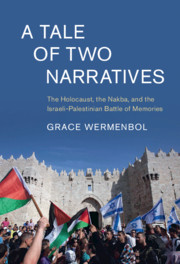Refine search
Actions for selected content:
2 results
Introduction
-
- Book:
- A Tale of Two Narratives
- Published online:
- 14 May 2021
- Print publication:
- 27 May 2021, pp 1-21
-
- Chapter
- Export citation

A Tale of Two Narratives
- The Holocaust, the Nakba, and the Israeli-Palestinian Battle of Memories
-
- Published online:
- 14 May 2021
- Print publication:
- 27 May 2021
